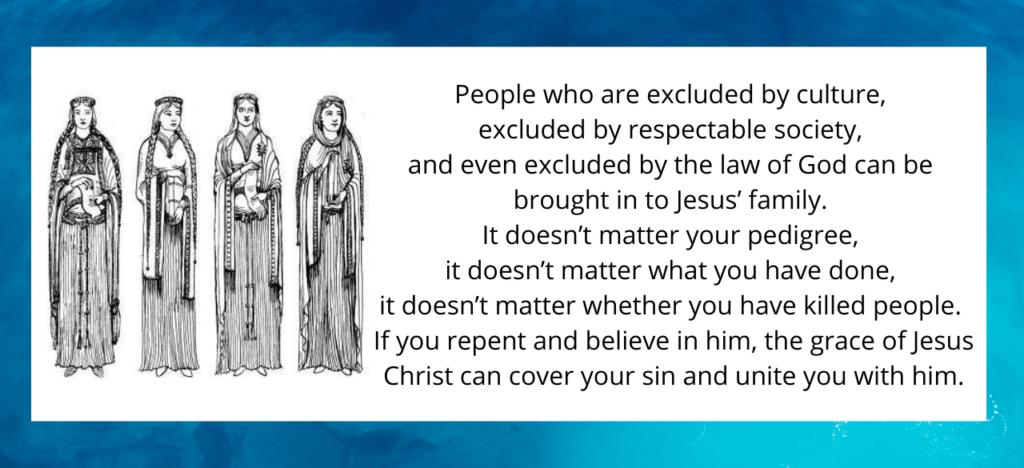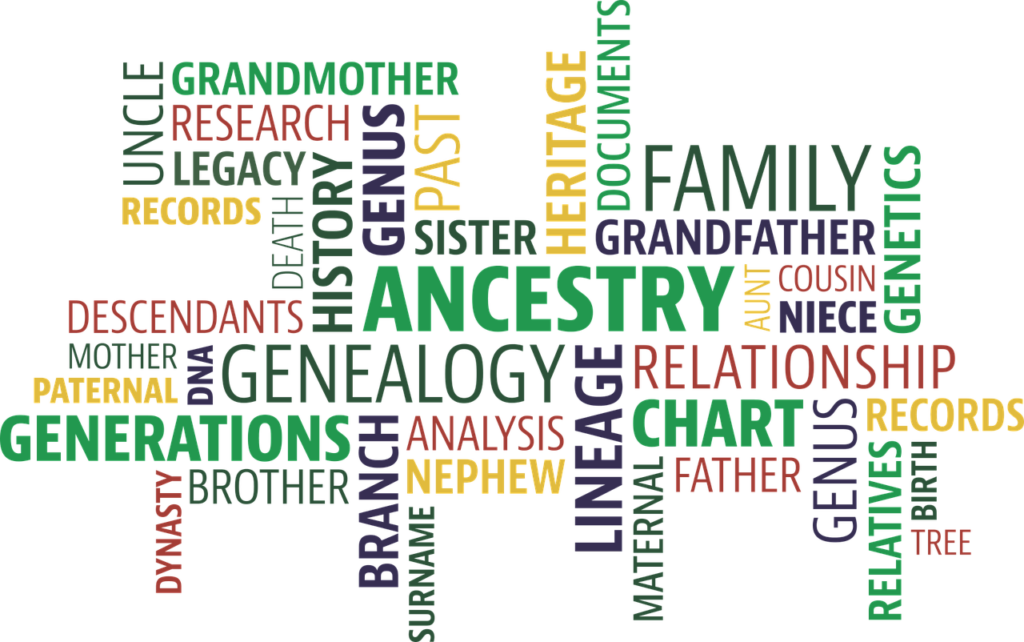This is the genealogy of Jesus the Messiah
Matthew 1:1-7a, 15-16
the son of David, the son of Abraham:
Abraham was the father of Isaac,
Isaac the father of Jacob,
Jacob the father of Judah and his brothers,
Judah the father of Perez and Zerah, whose mother was Tamar,
Perez the father of Hezron,
Hezron the father of Ram,
Ram the father of Amminadab,
Amminadab the father of Nahshon,
Nahshon the father of Salmon,
Salmon the father of Boaz, whose mother was Rahab,
Boaz the father of Obed, whose mother was Ruth,
Obed the father of Jesse,
and Jesse the father of King David.
David was the father of Solomon,
whose mother had been Uriah’s wife,
Solomon the father of Rehoboam
—
Elihud the father of Eleazar,
Eleazar the father of Matthan,
Matthan the father of Jacob,
and Jacob the father of Joseph, the husband of Mary, and Mary was the mother of Jesus who is called the Messiah.
My dad is a genealogy enthusiast. He’s been tracing his family, my mom’s family, for a while now. In order to keep up with his agile mind, I also try to trace family ties. I’m not as dedicated as he is, nor am I as persistent. Dad seems to love the tidbits of history on his way to the next long-lost relative … and I just want to fill in the blanks.
As Ron and I start a new Bible reading plan today, New Year’s Day, we start with the genealogy in Matthew. Are you put off by the long lists of names? Do you wonder why they are included? Have you ever just skipped through them, reading every other line or two? I have! But not today. I’ve been reminded recently that if we are in Christ, then this is our genealogy as well. These are my ancestors! And Matthew’s recounting of the genealogy of Jesus is particularly fascinating.
There are five women mentioned in the genealogy of Matthew which is remarkable, atypical in a patriarchal society. But even more remarkable are the women that carried the line of Jesus forward. Notice who is listed.
“Judah the father of Perez and Zerah, whose mother was Tamar“
Tamar’s story is in Genesis 38. It’s a complicated story of a widow whose father-in-law, Judah, was remiss in following through with cultural expectations. Tamar was widowed. Her husband’s brothers should have married her to continue their dead brother’s bloodline. But they did not fulfill their responsibilities. Judah made a promise that a third son would do so, but he never really intended to make that happen. So Tamar risked her reputation, even her life to continue the family lineage. She dresses as a shrine prostitute, and Judah asks for her services. Tamar makes Judah pay specifically requesting items that would identify him later as the father of her baby! It is interesting to note that this event is a turning point in Judah’s life. When his sin catches up with him he says, “[Tamar] is more righteous than I, since I wouldn’t give her to my son Shelah.”
“Salmon the father of Boaz, whose mother was Rahab“
Rahab’s story is in Joshua 2 and 6. The scripture says that Rahab was a Canaanite prostitute, a Gentile, who hid Joshua’s spies in return for safety for her and her family. She insisted that her family would be protected! Rahab is listed in Hebrews 11 Hall of Faith!
“Boaz the father of Obed, whose mother was Ruth“
Ruth’s story is often told as a sweet story of love for her mother-in-law, “Your people shall be my people, and your God, my God!” Ruth was an outsider, a Moabitess, of pagan heritage. She becomes part of the lineage of Jesus in her marriage to Boaz, her kinsman-redeemer!
“David was the father of Solomon, whose mother had been Uriah’s wife“
Bathsheba isn’t named but she was Uriah’s wife. Bathsheba’s adulterous relationship with David, their marriage after Uriah’s murder – it’s the stuff of daytime soap operas. Interestingly, Bathsheba made David promise that her son, Solomon, would be the next king – and later saved Solomon’s life when Adonijah was trying to set himself up as the king.

“Jacob, the father of Joseph, the husband of Mary, and Mary was the mother of Jesus“
We don’t know a lot about Mary. She was a young girl, betrothed to be married, living in Nazareth. What is significant is her response to the angel’s message! She submits to the angel’s message, submits her life to God’s will at this moment. We might imagine that she has not yet counted the cost. But her decision is made, “may your word to me be fulfilled!” Mary models for us how to submit to God’s will by simply saying yes.
This list is intriguing, women whose behavior was unconventional – unlikely candidates for recognition in Jesus’ lineage! Talk about skeletons in the closet! And yet each of these women was assertive, exhibiting strength in decision-making! And certainly, they represent the mercy and grace of God! They made a huge difference in history! In each case, they carried the lineage of Jesus forward. And, of course, these are just a few women, only 5 mentioned in hundreds of years of birthing! There were many more, maybe just as scandalous, maybe only ordinary women, certainly many who we already know. I wonder why Sarah, the mother of a nation, Rebekah, the scheming wife of Isaac, Nitzevet, possibly the unnamed mother of King David (only mentioned in the Jewish Talmud), or Abijah, the mother of Hezekiah are not listed. Why just the five!!
When thinking about Jesus’ lineage, it feels a little surprising to find prostitution, adultery, and pagan foreigners. The Messiah redeemed the pain, loss, and sin in each of these women – each in their own ways, unlikely heroes, grace stories, in the story arc of salvation! In choosing to name these women, God illustrates for us that Jesus came to rescue all people, even those living on the margins of life, even those with the least status in society.
The author of Hebrews reminds us that our spiritual genealogy is significant. In chapter 11, he enumerates many of the faithful, and in chapter 12, says, “Therefore, since we are surrounded by such a great cloud of witnesses, let us throw off everything that hinders and the sin that so easily entangles.” Our spiritual heritage, the long-lost relatives in our genealogy, those that were counted among the faithful, they are our great cloud of witnesses to the faithfulness of God.
As you read the scripture this year, don’t skip the genealogies. They anchor God’s grand narrative in history, giving real people, real faces to the details of His story!
What can we learn from Matthew’s genealogy? God uses people who are unconventional, assertive, God-fearing, to make a difference in our world! He uses people like us!
There is only one God, the Eternal; worship Him with respect and awe; take delight in Him and tremble.
Psalm 2:11 VOICE
